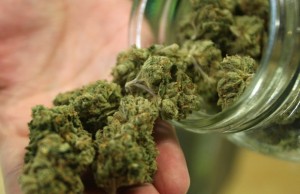 Maryland already has some of the toughest gun laws in the country, and now the medical marijuana program may contribute to even tighter restrictions on gun ownership in the state. The Attorney General recently went on record stating his office would no longer sit back and let the states implement marijuana policy without the threat of federal government interference. This doesn’t necessarily mean (we hope) that the DEA is plotting to raid recreational and medical marijuana grow houses and dispensaries across the country, but there is certainly some cause for concern. Here in Maryland the medical marijuana program just became functional after years of work by thousands of people who put in time and millions of dollars for the little green plant to become available with a doctor’s approval. The program is not going anywhere, so patients and investors probably need not fear the worst. But there may have to be some sort of effort to keep the feds at bay, and a firearms crackdown could serve this purpose.
Maryland already has some of the toughest gun laws in the country, and now the medical marijuana program may contribute to even tighter restrictions on gun ownership in the state. The Attorney General recently went on record stating his office would no longer sit back and let the states implement marijuana policy without the threat of federal government interference. This doesn’t necessarily mean (we hope) that the DEA is plotting to raid recreational and medical marijuana grow houses and dispensaries across the country, but there is certainly some cause for concern. Here in Maryland the medical marijuana program just became functional after years of work by thousands of people who put in time and millions of dollars for the little green plant to become available with a doctor’s approval. The program is not going anywhere, so patients and investors probably need not fear the worst. But there may have to be some sort of effort to keep the feds at bay, and a firearms crackdown could serve this purpose.
In order to appease the justice department, the Maryland State Police may become more involved in policing long standing federal policy that users of illegal drugs are prohibited from purchasing or receiving guns. The gun control act under 18 U.S.C 921 lays out certain prohibitions for receiving a firearm, and a violation of this federal statute could be punishable by up to 10 years in prison and a whopping $250,000 fine. Each person who purchases a firearm in Maryland is required to fill out a federal firearms transaction record, which is monitored by the ATF. One of the questions on the form asks whether the gun purchaser is an unlawful user of marijuana, narcotics, or any other controlled substances, and then in bold type states that “the use or possession of marijuana remains unlawful under Federal law regardless of whether it has been legalized or decriminalized for medicinal or recreational purposes in the state where you reside”. A person who answers yes to this question is unequivocally barred from purchasing a gun, and a Maryland medical marijuana card will do nothing to prevent the feds from filing charges.
It is difficult to enforce the provision of the gun control act that bars illegal drug users from purchasing handguns for obvious reasons. Gun shops are not administering polygraph tests to prospective buyers, and the ATF cannot show up at a recent gun purchaser’s door to administer a drug test. But in Maryland all medical marijuana patients are required to sign a release allowing the state health department to disclose the identity of cardholders to the state police. This would give the state police all the ammunition it needs to assist the feds in enforcing the federal gun control act. The worry is that state and local law enforcement may start arresting medical marijuana patients who purchase guns in order to set an example, and to appease the justice department now that its leader has taken a public stance against weed. For the near future Maryland residents will have to choose between purchasing or receiving a firearm and enrolling in the medical marijuana program. Even card holders who have yet to make their first purchase of medical pot should worry when buying a firearm, as the mere fact of their enrollment in the program could lead to major criminal liability. After all the progress we have made in last decade with respect to marijuana policy, the AG’s recent statements are a major step in the wrong direction. The only real solution is for Congress to get together and scrap federal laws making marijuana a controlled substance. We are confident this will happen eventually, but waiting on lawmakers to right a wrong is a frustrating proposition to say the least.
Benjamin Herbst is a criminal defense lawyer who handles gun crimes and drug offenses such as distribution in all Maryland state and federal courts. He has extensive experience defending out of state clients, and those who have been charged with illegal possession of a firearm by a convicted felon. Feel free to contact Benjamin anytime at 410-207-2598 to discuss your case at 410-207-2598.
 Criminal Defense Lawyer Blog
Criminal Defense Lawyer Blog

